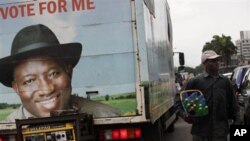After voting in parliamentary elections last weekend, Nigerians will once again head to the polls this Saturday. This time around, the people of Africa's most populous country are getting ready to choose their next president.
At a campaign rally in Lagos, presidential candidate Muhammadu Buhari, the leader of one of the main opposition parties, the Congress for Progressive Change, tells the crowd that despite Nigeria’s vast oil wealth, the majority of its people have not yet seen any benefit.
"Where is the money? Why has the infrastructure collapsed? Corruption, this is what’s destroying Nigeria," said Buhari, a former military leader.
Buhari first came to power in 1983 and some of his supporters say they remember the war he fought against corruption. But his rule only lasted two years because he was overthrown by the military.
In his own campaign, incumbent President Goodluck Jonathan is promising to improve health and education, and focus on the economy. "To move a country from third world to first world like it has been done in other countries, it’s the economy. That is central," he said.
This is the first time Jonathan has actually run for election. A Christian from the nation’s oil-rich southern delta, he inherited the presidency last year when his predecessor Umaru Yar’Adua, a Muslim from the north, passed away during his first term. Although Jonathan was the favorite coming into this year’s elections, his People’s Democratic Party saw significant losses in last Saturday's parliamentary voting.
President Jonathan also faces a challenge from former Nigerian anti-corruption czar Nuhu Ribadu. Leader of the Action Congress of Nigeria party, he is a former police officer who also once served as the country’s Economic and Financial Crimes Commissioner under former president Olesegun Obasanjo.
In a country where most people live on less than $2 a day, he says his number one priority would be to get ordinary Nigerians out of poverty. "I want you to give me the opportunity and the chance for me to lead this change that we desire in this country," he said.
Ibrahim Shekarau of the All-Nigerian People's Pary rounds out the list of major contenders - with numerous minor candidates also in the running.
Though economic issues play a large part in the campaign, religious identity is also a factor.
"There is no way you can take religion out of politics particularly in a democracy like Nigeria and lots of the candidates have used faith as a campaign element," said Fred Oladeinde, president of the Foundation for Democracy in Africa, based in Washington. He says religion is important but issues are even more important.
"I hope that when people go out on Saturday to vote, that they will despite their consideration for faith, they’ll put issues like security, stability, rights, and employment right in front as they also embrace their religion," he said.
Oladeinde also says this election is especially important for Nigeria's young people. "There’s still so many talented, well-educated Nigerian youth that still cannot find employment in one of the fastest growing economies in the world. This election is their election and they need to ensure that whoever is elected president of Nigeria is one that would ensure that their lunch, their breakfast and dinner is not eaten by the old political elite," he said.
The 2007 elections were reportedly marred by irregularities. Nigerians hope this year's will be free and fair.




